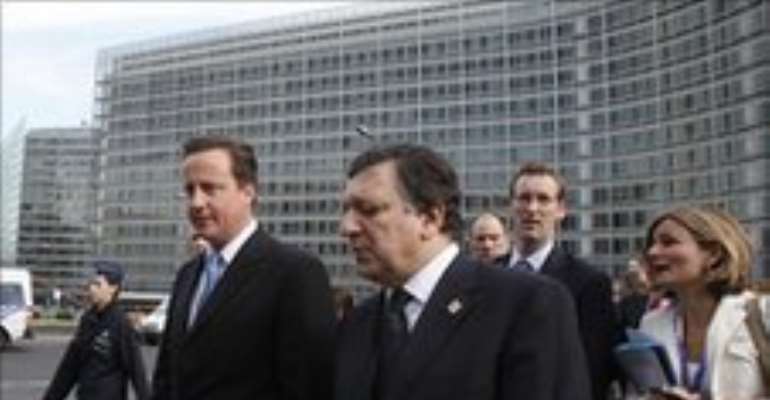EU LEADERS SEEK TO KEEP LID ON DEBT CRISIS

EU leaders are meeting to tackle the challenge of getting economic growth back on track while reining in the worst public debts for decades.
Leaders are intent on preventing contagion from the Greek budget crisis.
The summit comes amid particular concern about public finances in Spain, the fifth biggest eurozone economy.
Meanwhile, British Prime Minister David Cameron, attending his first EU summit, has promised to play a “positive” role in the bloc.
“We will of course always defend our national interests, as others do, and our national red lines,” he added, speaking alongside EU Commission chief Jose Manuel Barroso early on Thursday.
Both Mr Cameron and Mr Barroso said the EU should be focusing on “substance” rather than institutions.
Earlier Mr Barroso served up an English cooked breakfast of bacon, sausage and egg for Mr Cameron.
Spanish woes
Among the subjects for discussion at the summit are plans to improve budget scrutiny and establish sanctions to punish reckless spending.
EU leaders will back a bank levy to ensure that any future bail-out is financed mainly by banks rather than taxpayers.
Although details remain unclear, they will urge the US and other major economic powers to embrace a bank levy system at the G20 summit next week.
Officials have said concerns about the Spanish economy are not on the formal agenda of the summit.
But the issue is still expected to be a focus of attention.
On Thursday, the cost of borrowing for the Spanish government hit a record high as confidence in Spain's ability to repay its debts fell.
The government admitted this week that foreign banks were refusing to lend to some Spanish banks.
Spain has been forced to deny reports that it is in talks with the IMF over a bail-out package to help it manage its debts.
The country has announced budget cuts and – just hours before the summit – unpopular labour reforms to avoid a Greek-style meltdown.
The eurozone has set up a 750bn-euro (£623bn; $920bn) bail-out mechanism as a safety net in case any more countries suffer a similar debt crisis to Greece.
Budget surveillance
The draft summit document mentions EU member states presenting their budgetary plans to the European Commission each spring, “taking account of national budgetary procedures”, BBC Europe editor Gavin Hewitt reports.
He says there may be enough wriggle room in that language for the British to avoid a clash.
The UK has made it clear that its budget must go before the British parliament before being presented to EU officials for scrutiny.
However, the UK's pre-budget report is already fed into EU finance ministers' discussions before the full budget appears in April, a UK diplomat told the BBC.
The EU leaders are also expected to approve a new 10-year strategy for jobs and growth, drafted by the Commission, called “Europe 2020″.
It sets out a range of targets for employment, training and investment. Spending on research and development would reach 3% of gross domestic product (GDP) under the plan.
